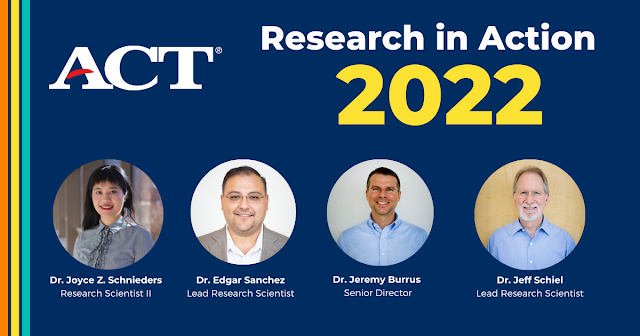der in the field.
In February, research on disparities in college preparation opportunities for students related to the pandemic, led by Dr. Joyce Z. Schnieders, revealed a direct link between participating in college preparation activities and the college application process. However, nearly half of the class of 2021 experienced the cancellation of at least one of these activities due to COVID-19 restrictions. The disparities found in college preparation opportunities were more likely to affect students from low-income backgrounds, Hispanic students, and Asian students. Dr. Schnieders’ insights gave ACT the opportunity to advocate for the needs of students as they work to achieve postsecondary success. These needs were further highlighted in a blog post by Lisa King, director of ACT’s American College Application Campaign, as well as in an article King wrote in Forbes.
Research on widespread and persistent grade inflation by Dr. Edgar Sanchez was released in May, and found that high school grades and GPA can be subjective, reflecting a combination of performance and student characteristics. Standardized metrics like the ACT test offer a fair way to evaluate students’ mastery of content, and, used alongside high school GPA, provide a more reliable predictor of college success. Dr. Sanchez’s findings were highlighted by education reporters, including articles in The Hechinger Report, Education Week, and The 74. His research affirms ACT’s recommendation to evaluate students holistically, including using an objective measure like an ACT or SAT score, to help schools make admissions and scholarship decisions.
Dr. Jeremy Burrus, senior director of the Center for Social, Emotional, and Academic Learning at ACT, was first editor of “Assessing Competencies for Social and Emotional Learning: Conceptualization, Development, and Applications.” Highlighting ACT’s contribution to the field, multiple chapters were written by ACT researchers, including Drs. Alex Casillas, Kate E. Walton, and Jason Way, as well as ACT Senior Learning Solutions Designer Kristin Stoeffler. The book explores the ideation, development, and implementation of social and emotional learning assessments. Read more in our press release.
ACT Lead Research Scientist Dr. Jeff Schiel authored research that found that students are optimistic about their future outcomes. He evaluated students’ perspectives on their futures and how their outlooks are affected by their backgrounds. Some key points from Dr. Schiel’s findings included that Black students are the most optimistic in having a better life than their parents, and family income is related to optimism irrespective of race/ethnicity. Encouraging to note, this research found that the pandemic had little effect on optimism despite the negative societal changes. Read more in the press release and an Education Week article featuring the findings.
ACT’s research team helps advance ACT’s mission through high-quality evidence and data, providing research-based insights that inform policy and advocacy. Our research experts offer a range of knowledge and skills, enabling ACT to deliver necessary information to policymakers, educators, and other stakeholders across the education and workforce ecosystem. ACT Research produced important and timely research this year, which will help shape and influence the education ecosystem as we look into 2023 and beyond.
